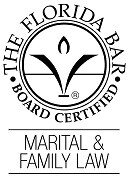Tampa Same Sex Divorce Attorneys
We are dedicated and experienced attorneys who provide results
2015 was a milestone for same-sex couples. It an exciting time for us as we saw very significant changes in both state and federal laws. The Florida courts and now the Supreme Court of the United States have pronounced marriage equality. Same-sex couples may now exercise their fundamental right to marry in all states and there is no lawful basis for a state to refuse to recognize a lawful same-sex marriage performed in another state.
The Road to Same-Sex Marriage Equality
The Right of Same-Sex Couples to Marry in Florida
In the matter of Huntsman v. Heavlin, on January 5, 2015, Judge Luis Garcia officially declared that the stay on marriage between same-sex couples would expire on January 6th, meaning that same-sex couples could get married on that day. January 6, 2015, the freedom to marry took effect statewide in Florida.
The Right of Same-Sex Couples to Divorce in Florida
Despite the freedom to marry, the courts had not yet ruled on the right for same-sex couples to divorce. In the matter of Brandon-Thomas v. Brandon-Thomas, a same-sex couple who was married in Massachusetts subsequently moved to Florida. The parties also had a minor child together. A contested petition for dissolution of marriage was filed in October 2013 requesting that the trial court determine the issues of parental responsibility and equitable distribution. The birth and genetic mother of the minor child opposed the petition. A circuit court judge in Ft. Meyers, Florida, dismissed the petition and an appeal ensued.
In the matter of Shaw v. Shaw, a same-sex couple filed an uncontested petition for the dissolution of their marriage in Tampa, Florida. The petition requested recognition for their out-of-state marriage for the purpose of filing the divorce and, additionally, challenged the constitutionality of Florida’s ban on same-sex couples from marrying. At the time, under Florida law, it was unclear whether the parties' out-of-state marriage could be terminated, because Florida did not respect marriages between same-sex couples at that time. The issue was whether Florida's ban on same-sex marriage and the prohibition on recognizing such marriages unconstitutionally limited various constitutional guaranties including full faith and credit, access to courts, equal protection, and the right to travel."
On April 24, 2015, in the Brandon-Thomas matter, the Second District Court of appeal reversed the trial court and held that the "rational basis test" applied to a due process and equal protection analysis under the circumstances. Applying the rational basis test, the Court stated that the State of Florida (through the Florida Attorney General's Office) was required to show "any reasonable conceivable state of facts that could provide a rational bases for the classification." Because neither the Attorney General's Office nor the opposing party was able to meet their burden, the Second District Court of Appeal reversed the dismissal of the dissolution of marriage action and remanded it to the trial court to address the matter on its merits. On May 29, 2015, the Second District Court of Appeal reversed the dismissal of the dissolution of marriage in the Shaw matter and remanded it to the trial court.
Same-Sex Marriage is thee Law of the Land
On June 26, 2015, the Supreme Court of the United States of America decided Obergefell v. Hodges. In a 5-4 decision, the Court held that the Fourteenth Amendment requires a state to license a marriage between two people of the same sex and to recognize a marriage of two people of the same sex when their marriage was lawfully licensed and performed out of state. Accordingly, same-sex couples may now exercise their fundamental right to marry in all state and there is no lawful basis for a state to refuse to recognize a lawful same-sex marriage performed in another state.
In his historic opinion, Justice Kennedy gleaned four principles that compelled the freedom to marry:
At the heart of the decision to marry is the concept of “individual autonomy,” a talisman of conservatives and liberals alike. Autonomy was the basis for every Supreme Court extension of the marriage right and it was the basis of many of intimate choice cases, like the right to contraception generally and the right to contraception for unmarried persons, and many others. Second, the marriage right is fundamental because the two-person marriage union is unique, essential, and “important to committed individuals” It would be unfair to let the liberty of gay persons stop at Lawrence, which only guaranteed a gay person’s right to express himself intimately with whomever he chooses. Third, same-sex marriage benefits children and, as such, a general freedom to marry for gays is also justified under the these principles that guarantee us the freedom to raise, education, and support children. Fourth, because marriage is essential for our “social order,” marriage enhancing laws, like marriage equality, are in the state’s interests.
Justice Kennedy concluded his opinion by stating that "[n]o union is more profound than marriage, for it embodies the highest ideals of love, fidelity, devotion, sacrifice, and family. In forming a marital union, two people become something greater than they once were. As some of the petitioners in these cases demonstrate, marriage embodies a love that may endure even past death. It would misunderstand these men and women to say that they disrespect the idea of marriage. Their plea is that they do respect it, respect it so deeply that they seek to find its fulfillment for themselves. Their home is not to be condemned to live in loneliness, excluded from one of civilization's oldest institutions. They ask for equal dignity in the eyes of the law. The constitution grants them that right."
“Decisions about marriage are among the most intimate that an individual can make. This is true for all persons, whatever their sexual orientation.”
We are Here to Fight for Your Rights
While we celebrate marriage equality and a year of historic changes in the law, we recognize the truth that not all relationships last and some marriages end in divorce. Tampa Bay Family Law & Mediation, P.A., is a boutique Tampa Bay area divorce and family law firm and we have the dedication, experience, and commitment to represent you.
We are advocates experienced in family law matters involving alimony, child custody, child support, equitable distribution, military divorce, paternity, and relocation. Our attorneys have held prominent leadership positions in the Tampa community, published numerous articles, and taught courses in continuing legal education (CLE) to other lawyers.
We represent our clients zealously
We pride ourselves on doing our best in every case. Every client is important. We represent people in all walks of life and in all types of family law matters, from alimony disputes to complex custody battles to high-net worth asset allocations. People come to us when they need lawyers who handle complex cases, difficult situations, and deliver proven results.
We are Experienced in Negotiation and Litigation
Our attorneys are not just book smart; we are trained advocates who learned how to “think on our feet” in Tampa courtrooms. Our lawyers have been recognized by our peers, the Florida Bar, and independent legal publications. With over 20 years of combined experience in marital and family law, you can be confident that our adversaries know that we mean business. We take great pride in working hard to negotiate cost-effective resolutions outside the courtroom. We understand the risks, expense, and emotional drain of prolonged litigation, and we strive to accomplish our clients' objectives through collaboration, creative thinking, and mediation. However, if necessary, we are always ready to fight for you rather than give in to the unreasonable demands of litigation bullies.
Contact Your Tampa Divorce And Family Law Firm Today
Our law firm located in Tampa practices divorce and family law throughout Florida, but primarily represents clients in Hillsborough, Pinellas, Pasco, Polk, Manatee, and Sarasota counties. Wherever you need a team led by an expert attorney who is Board Certified in Marital and Family Law, we stand ready to help. We thank you for taking the time to review our website. Should you have questions or if would like to schedule a consultation at our Tampa office, please contact us at (813) 251-6222.







